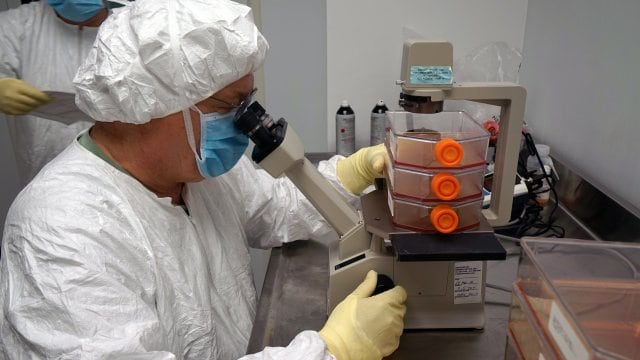Human trials of the Army’s Zika vaccine show the vaccine was safe and produced a “robust” immune response among volunteers who received it, the Army announced Wednesday.
The first phase of human clinical trials of the vaccine indicate it is “well-tolerated” in 67 healthy adult volunteers, Army officials said in a release, citing findings published Monday in the medical journal The Lancet.
Scientists at the Walter Reed Army Institute of Research conceived the Zika purified inactivated virus vaccine, or ZPIV, in early 2016 as part of the Defense Department’s response to the Zika virus outbreak in the Americas in 2015. Clinical human trials began in November 2016.
The virus is spread to humans primarily through infected mosquitoes, and can cause fever, rash and joint pain. Pregnant women are warned to take protective measures as babies of infected mothers can be born with health problems such as microcephaly, which causes the baby’s head to be unusually small. Infants may also develop health problems over time.
“It is imperative to develop a vaccine that prevents severe birth defects and other neurologic complications in babies caused by Zika virus infection during pregnancy,” Dr. Kayvon Modjarrad, WRAIR’s director for Emerging Infectious Diseases, said in the release. Modjarrad is co-lead of the Zika program and lead author of the article about the trial results.
“These results give us hope that a safe and effective vaccine will be achievable,” he said.
The initial results reported are from three Phase 1 clinical trials. In the three trials, 55 volunteers received the vaccine and 12 received a placebo. Results showed more than 90 percent of those who received the vaccine developed an immune response against the Zika virus.
The results are important for the military community, said the Zika program leader at WRAIR.
“Zika remains a threat to U.S. military personnel and families of service members,” Col. Nelson Michael said in a release Monday from the National Institutes of Health. “We aim to develop a vaccine to protect the military, as well as the global community.”
Next will be evaluations to see how long the immunity lasts, and more about the dosage and schedule for receiving the vaccine.
WRAIR is funding the trials along with the National Institute of Allergy and Infectious Diseases, part of the National Institutes of Health.
In ongoing research at WRAIR, the scientists will be looking at the impact of pre-existing immunity by vaccinating participants with a yellow fever or Japanese encephalitis vaccine, then giving them the ZPIV vaccine. All those viruses are members of the flavivirus family.
In the announcement about results of the Phase 1 clinical trials, Army officials did not say when the vaccine might be available, but they do note the urgency of the project.
“WRAIR has previously steered to licensure a similar vaccine for Japanese encephalitis ... which helped speed our vaccine development effort,” Dr. Leyi Lin, leader of one of the trials, said in the release.
Kathleen Curthoys is editor of Army Times. She has been an editor at Military Times for 20 years, covering issues that affect service members. She previously worked as an editor and staff writer at newspapers in Columbus, Georgia; Huntsville, Alabama; Bloomington, Indiana; Monterey, California and in Germany.





